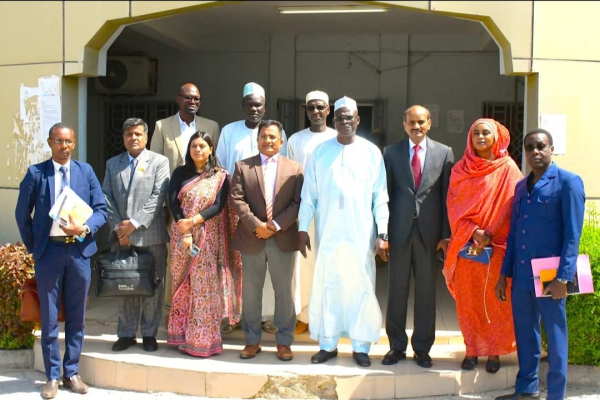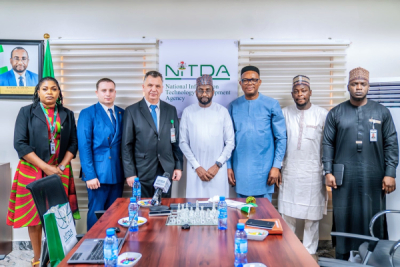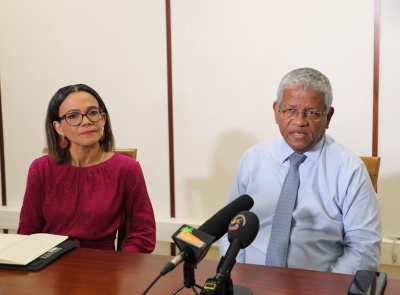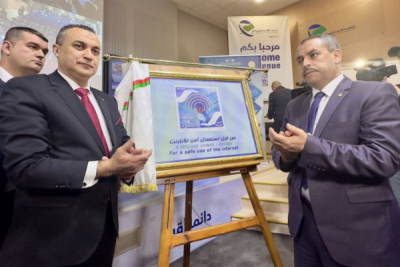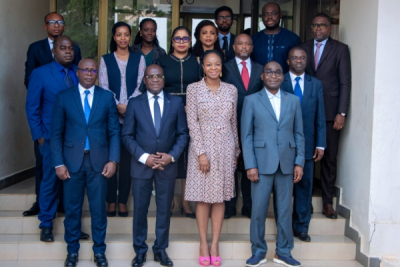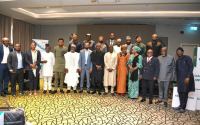
Public Management (599)
Chadian authorities are looking to position digital technology as a key driver of the country’s socioeconomic development. To achieve this, N’Djamena is relying on international cooperation.
The Chadian government is exploring a partnership with India to bolster its digital economy. Discussions focused on this potential collaboration took place Friday between Chad’s Minister of Communications, Digital Economy, and Digitalization, Boukar Michel, and India’s Deputy Minister of Foreign Affairs for Central and East Africa, Sevela Naik Mude.
The talks centered on three key areas: training Chadian engineers in artificial intelligence (AI), supporting the National School of Information and Communication Technologies (ENASTIC) with specialized training for students and faculty, and accelerating the digitization of postal services, including a proposed postal bank.
Chadian officials see India as a global leader in digital technology. India ranks 97th out of 193 countries on the UN’s e-Government Development Index (EGDI), with a score of 0.6678 out of 1, surpassing the global average of 0.6382. The International Telecommunication Union (ITU) also recognizes India for its cybersecurity expertise.
Chad hopes to leverage India’s experience to make digital technology a driver of socioeconomic development. In December 2024, the government launched the $122.3 million (76.45 billion CFA francs) World Bank-funded Digital Transformation Support Project (PATN). Chad’s current EGDI score of 0.1785 lags behind the Central African regional average (0.3354), the African continent (0.4247), and the global benchmark. The country’s cybersecurity classification is Tier 4 out of five.
Discussions between Chad and India are in their early stages, and no firm commitments have been made. However, both sides expressed interest in formalizing the partnership through a memorandum of understanding. No timeline has been announced.
By Isaac K. Kassouwi,
Editing by Sèna D. B. de Sodji
The rise of social media and the internet has intensified the spread of harmful and misleading content. This surge in disinformation poses a threat to social stability, especially in Africa, where it can create confusion and exacerbate tensions.
Francophone Africa now has a dedicated mobile application to combat disinformation. Launched on Thursday, February 6, by Tama Média, La Voix de Mopti, and Sétanal Média, with support from Organisation Internationale de la Francophonie (OIF), the AKILI app aims to bolster fact-checking in a region increasingly saturated with misleading content.
“AKILI relies on a unique combination of cutting-edge technology, artificial intelligence, and human intervention to provide a solution tailored to the region's complex challenges,” the project’s initiators explained. “By leveraging advanced algorithms, AKILI analyzes and verifies information from reliable sources while allowing users to seek expert input from specialized journalists for more complex cases. This hybrid approach ensures a high level of accuracy and credibility.”
The launch is part of the Jumelages entre initiatives francophones de lutte contre les désordres de l'information" (Collaborations between Francophone initiatives combating information disorders) program, which selected the three media partners as 2024 laureates. Designed with an intuitive and engaging interface, the app is accessible to all. It also promotes digital literacy by educating users on the mechanics of disinformation and fostering critical thinking—an essential skill given the growing spread of false information.
AKILI offers several key features: users can verify the authenticity of an article by pasting its link into the chatbot; query the AKILI chatbot via text, video, or voice note; submit fact-checking requests to specialized journalists when a claim cannot be automatically verified; and access educational content, including podcasts and fact-checking videos. These resources are available in French and African languages such as Fulfuldé, Bambara, Wolof, Lingala, and Swahili.
In an African context where disinformation can have significant consequences for social stability and community cohesion, AKILI positions itself as an essential tool. By improving access to reliable information, the app aims to strengthen public trust in the media and contribute to both social stability and sustainable development across African societies.
By Samira Njoya,
Editing by Sèna D. B. de Sodji
Nigeria is leveraging digital technology to enhance public services. To achieve this, the government is actively pursuing international partnerships.
Nigeria is exploring a partnership with Ukraine to digitize its public services. The topic was discussed during a meeting last week between Kashifu Inuwa Abdullahi (photo, center), Director General of the National Information Technology Development Agency (NITDA), and Ivan Kholostenko, Ukraine’s ambassador to Nigeria.
"The discussions centered on exchanging knowledge and exploring advanced digital solutions by leveraging technology to streamline public services, enhance transparency, and improve governance efficiency," NITDA stated in a social media release.
This initiative is part of Nigeria’s digital transformation strategy, which aims to digitize 75% of public services by 2027. As of now, the One Gov platform (Services - 1gov.ng) provides access to 271 digital public services, according to the GSMA. Meanwhile, the Data.gov.ng portal makes non-sensitive government datasets publicly available, promoting transparency and inclusion. The government is also rolling out an Electronic Document Management System (EDMS) to digitize all administrative records.
Currently, Nigeria ranks 144th out of 193 countries in the United Nations E-Government Development Index, with a score of 0.4815 out of 1. While this places the country above the averages for West Africa and Africa, it remains below the global average. In the Online Services sub-index, Nigeria scores 0.5372 out of 1.
In contrast, Ukraine ranks 30th globally in e-government development, with a score of 0.8841, surpassing the averages for the world, Eastern Europe (0.8127), and Europe as a whole (0.8493). The country relies heavily on its Diia app, which the Ukrainian delegation presented to NITDA. This digital platform centralizes government services, databases, and state registries within a unified ecosystem.
While Ukraine has the expertise to support Nigeria, the partnership remains at the discussion stage, with no agreement signed or announced. Additionally, digital service adoption in Nigeria faces obstacles, including limited Internet access. According to the GSMA, 120 million Nigerians still lack access to mobile Internet.
Isaac K. Kassouwi
Digital transformation is a crucial step in improving government efficiency, reducing bureaucracy, and fostering economic growth. Digitalization of public services is essential for enhancing transparency, reducing processing times, and improving accessibility for citizens and businesses.
On February 7, President Wavel Ramkalawan of Seychelles visited the Registrar General’s Office. The visit reaffirmed his administration’s commitment to digitalizing public services.
During the visit, he toured key departments, including Business Registration and Intellectual Property, which play vital roles in business development and innovation protection. He also engaged with senior management to discuss institutional achievements, ongoing challenges, and modernization efforts aimed at improving service efficiency.
Addressing the media alongside Registrar General Wendy Pierre, President Ramkalawan praised the office’s progress in digitalization, emphasizing its role in enhancing service accessibility. He also announced upcoming legislative reforms to support the transition to modernized operations.
The Registrar General’s Office remains focused on creating a transparent, efficient, and technology-driven framework to support Seychelles' development, with digital services set to improve accessibility and efficiency for all citizens.
Globally, digital transformation in government has proven to increase efficiency and reduce corruption. The 2024 UN E-Government Development Index (EGDI), which evaluates e-government readiness and e-participation across UN Member States, ranks Seychelles 92nd out of 193 countries with a score of 0.6773 (out of 1). This reflects its progress in adopting digital services. However, further modernization efforts are necessary to maintain this lead.
Hikmatu Bilali
Algeria is stepping up its efforts to protect citizens online, particularly children, as internet and digital technology use grows. This increased focus aims to address the rising online risks faced by an increasingly connected population.
Sid Ali Zerrouki (photo, left), Algeria’s Minister of Post and Telecommunications, launched a national awareness campaign on Saturday, February 8, aimed at protecting children from the dangers of unsafe internet use. The initiative focuses on risks related to online gaming, web browsing, and social media and will run until February 14.
“This civic initiative aims to raise awareness among children, parents, and educators about best practices for safe internet browsing. It also seeks to inform them about ways to detect and avoid hidden cyber threats, while providing advice, recommendations, and best practices for the responsible use of digital tools,” the Ministry of Post and Telecommunications said in a release.
According to Minister Zerrouki, the program addresses the growing risks of the digital world, which require a preventive and proactive approach to protect citizens, particularly vulnerable groups such as children. The United Nations Children's Fund (UNICEF) estimates that more than one-third of young people in 30 countries worldwide have experienced cyberbullying, and one in five has missed school because of it. The organization also warns of other dangers, including hate speech, violent content, targeted marketing, screen addiction, and online exploitation and abuse.
The initiative aims to create a safe digital environment where children can fully benefit from being online. “Growing up online offers unlimited opportunities. Through computers, smartphones, gaming consoles, and televisions, children learn, imagine, and develop their social networks. When used wisely and made accessible to all, the internet has the potential to broaden horizons and spark creativity worldwide,” UNICEF explains.
Official statistics show internet subscriptions in Algeria grew from 39.8 million in the second quarter of 2019 to 54.9 million in the same period of 2024. While the number of children with internet access is unspecified, 35.2% of Algeria’s 45.95 million inhabitants (as recorded by DataReportal in early 2024) are aged 0 to 17. UNICEF also reports that a child goes online for the first time every half-second globally.
By Isaac K. Kassouwi
Editing by Sèna D. B. de Sodji
Many African countries are making digital transformation a cornerstone of their socioeconomic development strategies. To achieve their ambitions, they are increasingly relying on regional and international partnerships.
Togo and Côte d'Ivoire are looking to strengthen their collaboration on digital transformation. The topic was discussed during a meeting Thursday between Togo’s Minister of Digital Transition and Digitalization, Cina Lawson, and her Ivorian counterpart, Kalil Konaté, who was on a working visit to Lomé.
The discussions covered key areas such as electronic communications regulation, digital innovation, infrastructure improvement, cybersecurity, digital resilience, and the protection of critical digital infrastructure.
The meeting reflects both countries’ ambitions for digital transformation. Togo’s “Togo Digital Strategy” aims to establish the country as a leading digital hub while improving citizens' quality of life through digital services. Ivory Coast’s digital agenda centers on boosting national economic growth by expanding digital services and making everyday life easier.
A joint study by the International Finance Corporation (IFC) and Google projects Africa’s digital economy will reach at least $712 billion by 2050, representing 8.5% of the continent’s GDP. The World Bank estimates Ivory Coast's digital economy could generate over $20 billion by 2050, contingent on increased public and private investment in five key pillars of digital development.
Currently, Togo lags in digital governance. The 2024 UN E-Government Development Index gave Togo a score of 0.3920 out of 1, below the West African average (0.3957), the African average (0.4247), and the global average (0.6382). Ivory Coast, ranked 124th globally with a score of 0.5587, performs better than regional averages but remains below the global benchmark.
In cybersecurity, the International Telecommunication Union (ITU) ranked Togo and Ivory Coast in Tiers 2 and 3, respectively, in its 2024 Global Security Index, highlighting the need for improved digital security measures in both countries.
By Isaac K. Kassouwi,
Editing by Sèna D. B. de Sodji
The digitization of public services is underway in several African countries. In Mali, authorities launched a digital platform in January to improve access to judicial services. In February, they are taking another step in the same direction.
Malian authorities have approved plans to establish a National Agency for the Security of Civil Status Documents, aiming to digitize these records and improve their reliability. The draft legislation was adopted during a Council of Ministers meeting last Wednesday and will be submitted to the National Assembly for approval before implementation.
The new agency will be tasked with strengthening the security of civil status documents by implementing electronic solutions for their design, production, identification, and authentication, according to an official statement. It will also support the Civil Status Data Processing Center, which currently faces challenges including poor coordination among stakeholders and weak document security.
This initiative aligns with Mali’s broader strategy to leverage digital technology for modernization and economic growth. Several projects are planned for 2025, including expanding the government’s intranet network to 15 new regions, developing and deploying specialized administrative applications, and launching a digital literacy platform.
In January, Malian authorities launched a digital platform to improve access to judicial services. The success of the new agency, however, will depend on the government’s ability to secure necessary resources and address challenges related to digital infrastructure and administrative staff training.
By Isaac K. Kassouwi,
Editing by Feriol Bewa
Beninese authorities have made digital technology a key pillar of the country's socioeconomic development. The government has recently begun searching for an expert to strengthen the development environment for digital public services.
The Beninese government aims to leverage Starlink’s space technology to improve Internet access in poorly covered areas and strengthen digital inclusion. This issue was one of three areas of cooperation discussed on Wednesday, February 5, during a meeting between Romuald Wadagni (photo, center), Minister of State for Economy and Finance, and representatives of U.S. company SpaceX, which operates the Starlink satellite Internet service.
Discussions also focused on developing innovative digital solutions for e-education and e-health—key drivers of social transformation—as well as enhancing connectivity for more effective border surveillance. “Digital inclusion is a key tool for addressing tomorrow’s challenges. This partnership illustrates our commitment to modernizing the country and reducing the digital divide for more inclusive and sustainable development,” said Wadagni.
This initiative aligns with the government’s vision of making “Benin the digital hub of West Africa” and using digital transformation as a key lever to accelerate economic growth. However, telecom adoption, particularly Internet use, remains limited.
According to the Regulatory Authority for Electronic Communications and Post Office (ARCEP), Benin had 8.5 million unique mobile subscribers, with a penetration rate of 67%. ARCEP estimates that by the end of 2023, the country had 7.0 million unique Internet users, representing 55.4% of the total population. The GSMA, the global association of mobile operators, reported that 3.8 million Beninese regularly accessed the Internet via mobile phones in 2023, accounting for 28% of the population.
Bridging this digital divide offers numerous benefits for the population. “The adoption of digital technologies opens new avenues for development, whether by increasing the added value of existing agricultural resources, facilitating access to global value chains, improving education and healthcare, reducing transaction costs, or enhancing the efficiency, transparency, and governance of government services for citizens and businesses,” the GSMA stated in its report “Driving Digital Transformation of the Economy in Benin: Opportunities, Policy Reforms, and the Role of Mobile”.
While Starlink launched commercial operations in Benin at the end of 2023, discussions with the government are still preliminary. No agreement has been signed or announced, and it is unclear how residents in underserved areas would specifically benefit from any potential partnership.
By Isaac K. Kassouwi,
Editing by Sèna D. B. de Sodji
Reliable internet connectivity is crucial for economic growth, education, healthcare, and innovation, particularly in remote areas with scarce terrestrial networks. By connecting underserved people to the internet, Africa can accelerate digital transformation, ensuring that more communities can participate in the global digital economy.
Satellite communications provider Eutelsat has successfully met its Partner2Connect Digital Coalition pledge - backed by the International Telecommunication Union (ITU) - two years ahead of schedule. This milestone, announced on February 5, marks the connection of 1 million underserved people in Sub-Saharan Africa to high-speed satellite internet, reinforcing Eutelsat’s commitment to bridging the digital divide and supporting the United Nations' 2030 Agenda for Sustainable Development.
Eutelsat Group CEO Eva Berneke emphasized the milestone's significance, stating: “This achievement highlights our commitment to digital inclusion and underscores how we leverage cutting-edge satellite network solutions to meet the challenging demands for low-cost, high-availability, and trusted services in Africa.”
The achievement was made possible through Eutelsat’s Konnect Wi-Fi hotspots, powered by the EUTELSAT KONNECT satellite, which has delivered affordable, high-speed internet to remote areas where traditional networks remain inaccessible. Offering speeds between 5 Mbps and 100 Mbps, the service has enabled access to education, e-commerce, healthcare, and business opportunities.
Eutelsat’s initiative aligns with global efforts to expand digital access, particularly in Africa, where only 37% of the population is online according to ITU Facts and Figures 2023. By leveraging satellite technology, the company is bridging connectivity gaps, unlocking new economic and social opportunities, and empowering communities in the digital era.
As Eutelsat continues expanding its reach, this achievement sets a strong precedent for the role of satellite internet in accelerating Africa’s digital transformation.
Hikmatu Bilali
While the global digital economy continues to grow, broadband connectivity remains a major challenge in Africa, despite its vast potential to drive development and economic opportunities.
The Federal Ministry of Communications, Innovation & Digital Economy has launched the National Broadband Alliance for Nigeria (NBAN) to accelerate broadband development and bridge connectivity gaps nationwide. The initiative was unveiled on Tuesday, February 4, 2025, in Lagos, bringing together key industry stakeholders to discuss expanding broadband access, strengthening multi-sector collaboration, and driving digital inclusion.
Dr. Aminu Maida, Executive Vice Chairman of the Nigerian Communications Commission (NCC) in an address on behalf of Minister ‘Bosun Tijani noted that despite efforts to achieve 70% broadband penetration by 2025, existing infrastructure remains underutilized. “Many of the networks remain underutilised. In numerous parts of the country, the capacity of existing fibre infrastructure far exceeds the demand,” he said.
The NBAN aims to address these challenges by expanding access, promoting awareness, and increasing investments in broadband infrastructure. The government has set ambitious targets in its National Broadband Plan 2020-2025, including 25 Mbps minimum data speed in urban areas and 10 Mbps in rural areas, 80% population coverage by 2027, and 300–500% increase in broadband investments by 2027.
The initiative is expected to unlock economic opportunities, drive innovation, and enhance Nigeria’s digital economy, ensuring broader access to high-speed internet for millions. According to the World Bank Digital Progress and Trends Report 2023, access to high-speed internet can increase an individual's likelihood of employment by up to 13.2% and boost total employment per firm by up to 22%.
Hikmatu Bilali
More...
Djiboutian authorities are stepping up initiatives to transform the country into a digital hub by 2035. This includes exploring support from other countries and international organizations.
Djibouti is ramping up efforts to implement its digital transformation roadmap, with the goal of becoming a technology hub by 2035. As part of this strategy, Mariam Hamadou Ali, Minister of Digital Economy and Innovation, met with representatives from the United Nations Economic and Social Commission for Western Asia (ESCWA) during a workshop on Monday, February 3.
In recent months, Djibouti has already engaged with several countries and international organizations, including the European Union, the International Telecommunication Union (ITU), India, and Qatar. Talks with Qatar have particularly focused on developing and strengthening cybersecurity partnerships.
The government's ambitions include expanding digital services, promoting ICT adoption, and creating a favorable investment climate for the private tech sector. However, Djibouti still faces challenges in its digital development.
According to the ITU, Djibouti currently ranks 17th in Africa out of 47 countries for ICT development, with a score of 61.6 out of 100. This marks a slight decline from 2023, when the country ranked 16th with a score of 63.6. Additionally, the United Nations e-Government Development Index (EGDI) places Djibouti in the "intermediate development" category, with a score of 0.2911 out of 1. On cybersecurity, the ITU classifies Djibouti in Tier 4 out of 5, grouping it with nations that demonstrate only basic government-driven cybersecurity initiatives.
International cooperation presents an opportunity for Djibouti to leverage the expertise of more advanced nations in digital transformation. However, most discussions remain at a preliminary stage, and it remains to be seen whether they will result in concrete agreements.
By Isaac K. Kassouwi,
Editing by Sèna D. B. de Sodji
Internet and social media shutdowns have become a trend in Africa during times of political or social unrest. These restrictions, often justified as necessary for security, raise serious concerns about freedom of expression and their negative economic consequences.
Residents of several Congolese cities have experienced disruptions to social media access, including TikTok and X, since Saturday, February 1. While no official statement has confirmed the restrictions, many believe they are linked to the tense situation in the country's eastern region and aimed at limiting information flow.
Disruptions have been reported in major cities, including Kinshasa, Goma, Bukavu, and Lubumbashi. Many users have been unable to connect to the platforms, while others have used virtual private networks (VPNs) to bypass the restrictions. NetBlocks, an internet monitoring organization, said data indicates a targeted restriction on social media and app download platforms, making VPN access more difficult.
The restrictions coincide with increased tensions in the DRC. The government accuses some of using social media to spread misinformation or incite unrest, while civil society organizations condemn the measures as an attack on freedom of expression.
The DRC joins several other African governments that have imposed internet restrictions during political or security crises. According to the Global Cost of Internet Shutdowns report, published in January by Top10VPN, a UK-based platform, Sub-Saharan Africa lost nearly $1.5 billion in 2024 due to internet shutdowns, social media blockages, and bandwidth throttling. Beyond direct economic losses for digital businesses and freelancers, these restrictions hinder online transactions, disrupt supply chains, and impact key sectors like e-commerce and digital services.
By Samira Njoya,
Editing by Sèna D. B. de Sodji
The country is banking on digital transformation to fuel its socioeconomic development. The government is stepping up initiatives to harness digital technology to improve access to services, enhance transparency, and drive innovation.
Senegal launched a digital platform last week for obtaining the National Identification Number for Enterprises and Associations (NINEA). Inaugurated by Economy Minister Abdourahmane Sarr, the initiative aims to streamline and expedite business and association registration.
The launch is part of Senegal's broader "New Technological Deal" digital transformation strategy, which seeks to establish the country as a regional innovation leader. The government is prioritizing the digitization of public and private services to improve administrative efficiency, digital inclusion, and transparency.
"NINEA registration covers businesses operating in Senegal, nationally or internationally recognized associations, trade unions, central public administrations, public institutions, local authorities, political parties, occasional operators, landowners, NGOs, and more," the National Agency for Statistics and Demography (ANSD) said in its third-quarter 2023 report.
The platform's success, however, hinges on internet access. DataReportal reports Senegal had 10.79 million internet subscribers, representing a 60% penetration rate.
By Isaac K. Kassouwi
Editing by Sèna D. B. de Sodji
Gabon is undergoing a significant digital transformation, embracing cutting-edge technology to modernize its public services and upgrade key urban infrastructure. This initiative aims to solidify its position as a leader in e-governance.
Gabon's Minister of Transport and Merchant Marine, Jonathan Ignoumba (photo, center), signed a memorandum of understanding on Wednesday with DSD, a company specializing in digitalization, according to government officials. The initiative aims to modernize transport documents, such as driver’s licenses and vehicle registration cards, while upgrading Libreville’s urban infrastructure with solutions like rotating parking systems and smart traffic lights.
Djemory Doumbouya, CEO of DSD, said his company, which is already active in Guinea, Uganda, and Liberia, will quickly mobilize resources to conduct feasibility studies. "Following this signing, we will develop a business plan, set an implementation timeline, and submit these elements to Gabonese authorities for approval before finalizing the contract," he explained.
The project aligns with Gabon Digital, a government initiative launched last November and overseen by a steering committee (Copil), focused on modernizing public services and streamlining administrative procedures. A digital platform will be deployed later this year to support these efforts, according to the committee.
If the implementation details are agreed upon, the project could significantly improve traffic management in Libreville, a city of nearly one million residents—about half of Gabon’s population. The capital faces growing congestion and stands to benefit from smart mobility solutions designed to reduce traffic jams, enhance road safety, and optimize urban space.
The digitalization of transport documents is also expected to bring multiple benefits, including fraud reduction, better data traceability, simplified administrative processes for citizens, and greater efficiency in managing public infrastructure.
By Samira Njoya,
Editing by Sèna D. B. de Sodji


